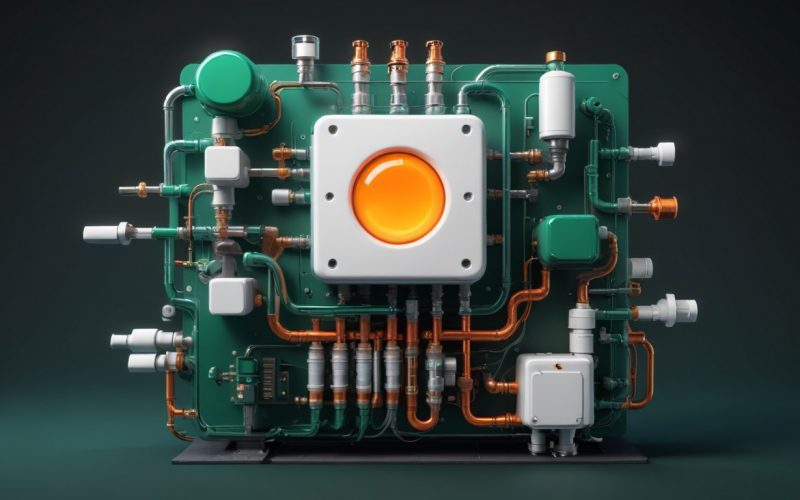Choosing the right heating system for your home is crucial for ensuring comfort, energy efficiency, and cost-effectiveness. Two of the most common options are electronic (electric) heating systems and gas heating systems. Each comes with its own set of advantages and drawbacks. This article will explore both types to help you make an informed decision.
compare Electronic vs. Gas Heating Systems
Electronic Heating Systems
Types of Electronic Heating Systems:
- Electric Furnaces: Use electric heating elements to warm air, which is then distributed throughout the home via ductwork.
- Heat Pumps: Transfer heat from the outside air or ground into the home. They can also work in reverse to cool the home during warmer months.
- Electric Baseboard Heaters: Installed along the baseboards of rooms, they use convection to heat the air.
- Radiant Floor Heating: Uses electric heating elements installed beneath flooring to provide heat directly to the floor.
Advantages:
- Efficiency: Electric heating systems are highly efficient, with most of the energy converted directly into heat.
- Safety: There are no risks of gas leaks or carbon monoxide poisoning.
- Installation Cost: Typically lower installation costs compared to gas systems.
- Maintenance: Require less maintenance as there are fewer mechanical parts and no combustion process.
Drawbacks:
- Operating Cost: Electricity can be more expensive than gas, leading to higher operating costs.
- Power Dependency: Electric heating systems are dependent on electricity supply, making them vulnerable to power outages.
- Heating Speed: Electric systems can take longer to heat a home compared to gas systems.
Gas Heating Systems
Types of Gas Heating Systems:
- Gas Furnaces: Burn natural gas or propane to heat air, which is then distributed through ductwork.
- Gas Boilers: Use natural gas or propane to heat water, which then circulates through radiators or underfloor heating systems.
- Gas Space Heaters: Standalone units that heat a single room or area using natural gas or propane.
Advantages:
- Operating Cost: Generally, natural gas is less expensive than electricity, leading to lower operating costs.
- Heating Speed: Gas heating systems can quickly heat a home due to the high heat output.
- Reliability: Gas systems can operate even during power outages, provided they have a battery-powered ignition system.
Drawbacks:
- Safety Concerns: There is a risk of gas leaks and carbon monoxide poisoning, which requires regular maintenance and monitoring.
- Installation Cost: Typically higher installation costs due to the need for gas lines and venting systems.
- Environmental Impact: Burning fossil fuels releases carbon dioxide and other pollutants, contributing to environmental concerns.
Factors to Consider
Climate:
- Mild Climates: Electric heating may be more cost-effective and sufficient for mild climates where heating needs are lower.
- Colder Climates: Gas heating systems are often more effective in colder climates due to their ability to produce more heat quickly and at a lower cost.
Availability of Resources:
- Gas Availability: If natural gas is not available in your area, you might have to rely on propane or stick with electric heating.
- Electricity Costs: In areas where electricity costs are high, gas heating might be a more economical option.
Environmental Impact:
- Electric Heating: Generally considered more environmentally friendly, especially when paired with renewable energy sources like solar panels.
- Gas Heating: Has a higher environmental impact due to the combustion of fossil fuels.
Initial vs. Long-Term Costs:
- Electric Heating: Lower initial installation costs but potentially higher long-term operating costs.
- Gas Heating: Higher initial installation costs but typically lower long-term operating costs.
Conclusion
Both electronic and gas heating systems have their merits and should be chosen based on your specific needs, budget, and environmental considerations. Electric heating systems are efficient and easier to install, but can be more expensive to operate. Gas heating systems offer lower operating costs and faster heating but come with higher installation costs and safety concerns. By evaluating your climate, resource availability, and long-term cost implications, you can select the heating system that best fits your home and lifestyle.



